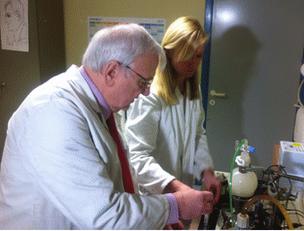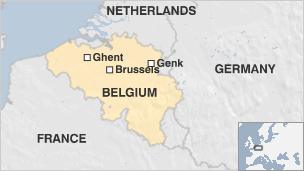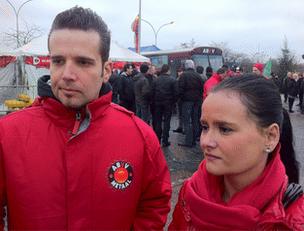Belgians feel bite of austerity
- Published

The EU provides milk for the poor
Has Europe put the worst of its economic woes behind it? European officials in Brussels say they believe the continent has turned a corner in its debt crisis but, as a social crisis develops across much of the continent, that is not how it feels just a short distance away in northern Belgium.
Tania Godefroot keeps her coat on while she waits her turn. The food bank she has come to is barely heated, and winter's frigid chill has made it feel like a refrigerator.
Eventually she gets to the front of the queue. A litre of milk, provided by the European Union to help the poor, goes into her bag. She takes some eggs, a few other provisions. Not much but every little bit counts these days.
"At the moment I'm surviving on 180 euros [£151; $240] a month," she says. "That's what left when the bills are paid - rent, electricity and hospital bills." Her daughter has been seriously ill.
She does not see any sign of things getting better: "There's less food to go round here because there are more people coming [to the food bank].
"As for jobs - the crisis has made it really hard to find work."
That may sound like a repetition of what you have heard out of Europe for several years now, but this is slightly different.
The food bank Tania goes to is in the town of Ghent, in northern Belgium - the region of Flanders.
Half an hour down the train tracks from Brussels, Ghent is the kind of classic Belgian city whose affluent, picturesque cobbled streets attract tourists throughout the year.
It is in one of the richer regions in Europe. Yet even here, while officials in Brussels express a sign of relief that, in their opinion, the worst of Europe's economic crisis is behind them - the poor are getting poorer.
Credit squeeze
Poverty is increasing, according to Peter Heirman from the Flemish Network Against Poverty: "Not spectacularly - but it's increasing.
"People are now losing their jobs. Companies have postponed the crisis for a couple of years, but now they have used all their reserves and there is no space left to keep the people employed.
"I think the social crisis is starting right now."
Belgium is one of the core countries of Europe, a founding member of what became the EU. It is doing better than the southern nations of this continent. Yet even here it is predicted that 2013 will be a year of stagnation. Last year, bankruptcies hit record levels.

Walter Verstraeten and his daughter Charlotte work on an industrial estate
Among those at risk right now are Walter Verstraeten and his daughter Charlotte.
In a small room on an industrial estate they are carefully measuring chemicals into glass tubes for a series of tests they are conducting.
For 10 years they have been building up their family firm, H&V Chemicals. Now they have just gone into bankruptcy protection.
"It's very difficult to get credit from the bank, especially if you are a small company and have had some difficulties," says Mr Verstraeten.
"If you look at the number of unemployed, the number of companies going bankrupt, the difficulties of companies getting some money, then I think it's just as bad [as elsewhere in Europe]," he adds.
Things are getting worse, but actually it is not as bad as Spain or Greece. Not that that is any comfort to the Verstraetens, as they struggle to keep their company afloat.
Unemployment in Flanders - at some 7% - is far below the record levels of southern Europe.
Public spending is coming under control. While total debt is still very high, this year the central government in Belgium expects its budget deficit to fall below the EU's target of 3% of GDP.
Broken taboos
According to economists like Koen Schoors at the University of Ghent, that is largely thanks to the crisis itself, which has forced governments like Belgium's to make unpopular, but necessary, changes.
"You see countries taking reforms that were not only unspeakable but also unthinkable - real taboos," he says.

"The European crisis is helping to create the sense of opportunity [for this]. I'm much more optimistic than a few years ago. Now a lot of [reforms] are happening and a lot of them in the right direction."
Among the changes that have helped Belgium's public finances is pension reform. People now have to work longer to get a full pension.
Unemployment benefit is also being changed, meaning that people who claim the payments will get less.
Good for the state coffers, perhaps - but it helps to explain why Europe's debt crisis is now becoming an economic and social crisis in even the continent's stronger economies.
Nowhere, perhaps, is that more apparent than in the eastern Belgian city of Genk (not to be confused with Ghent in the west).
'No future'
From atop a road bridge over the river, you can look down on a car park containing several thousand brand new Ford vehicles. They are expensive bargaining chips in the battle between management and workers.

Car workers like Mario and Debby face redundancy
Ford announced last October that it was closing its Genk factory. Some 4,000 jobs will go by the end of next year at the plant. One study predicts some 7,000 more will vanish in the local area as suppliers are also hit.
With Europe in recession, Ford simply has not been selling enough vehicles to keep Genk open.
So the workers went on strike, set up a picket outside the factory gates and told managers they would not allow the cars to be shipped off to buyers until a decent redundancy package had been drawn up.
They are back at work now, after some negotiation, but the cars remain "impounded" while talks continue.
Huddled by a fire to keep them warm, several dozen workers stand by. Among them is Debby Metten.
"I'm feeling very insecure because I don't know what's going to happen," she says. "I think I'm going back to school to train for a job where there is a future."
In this area, though, work is hard to find and her partner, Mario Vannoppen, knows it.
"I worked here 22 years," he says.
"I thought when I started - when I was 18 - I would get my pension here. Now, nobody has a future here."